Spain deservedly won the Euro 2024 final, but the inquiry from England’s perspective should not be about how their opponents in Berlin were better that night, but how much better they have been throughout the tournament.
If one were to rank the 14 performances of these two teams in this competition in order of quality, one would mention Spain’s seven, then England’s. That is the difference. Spain impressed and captivated in every game. They had weaknesses, as all teams do, but those weaknesses generally came from their bravery and attacking commitment.
England were disappointing in the group stage, never managing to score in attack but at least remaining solid defensively. And then, in the round of 16, excluding the penalty awarded in the semi-final against the Netherlands, England conceded a higher number of expected goals (xG) than they created in all four games.
And given the respective starting elevens, that simply shouldn’t be the case.
In the last Ballon d’Or, which is now contested on a seasonal rather than annual basis and was therefore decided around this time last year, Spain had no players in the shortlist of 30. The Guardian’s list of the world’s 100 best players drawn up at the end of 2023 had only three in the top 70. Of those three, Gavi missed all of Euro 2024 through injury, Pedri was ruled out for the remainder of the tournament after being injured early in the quarter-final against Germany, and Rodri had to come off at half-time in the final.
You might think that several Spanish players would be ranked higher this year. But the fact is that, by those standards, they were virtually deprived of all the established world stars last night in the crucial 45 minutes after the break.
Ultimately it was a victory of teamwork and cohesion over individualism.
England featured no fewer than 13 of the top 100 players on that list, including some who were not in Gareth Southgate’s 26-man squad for Euro 2024. England’s trump card going into the tournament was that they could count on arguably the best player in the Premier League (Phil Foden), the Bundesliga (Harry Kane) and La Liga (Jude Bellingham).
England was not short of stars, it was short of cohesion.
It is difficult to find a single collective concept that England have done well in the seven matches. Goalkeeper Jordan Pickford’s distribution was often very direct and when England tried to play out from the back there was no obvious pattern. Their passing network in the final shows absolutely no interaction between the attackers, and also reveals that their most frequent passing combination was centre-back John Stones laying the ball off to Pickford.
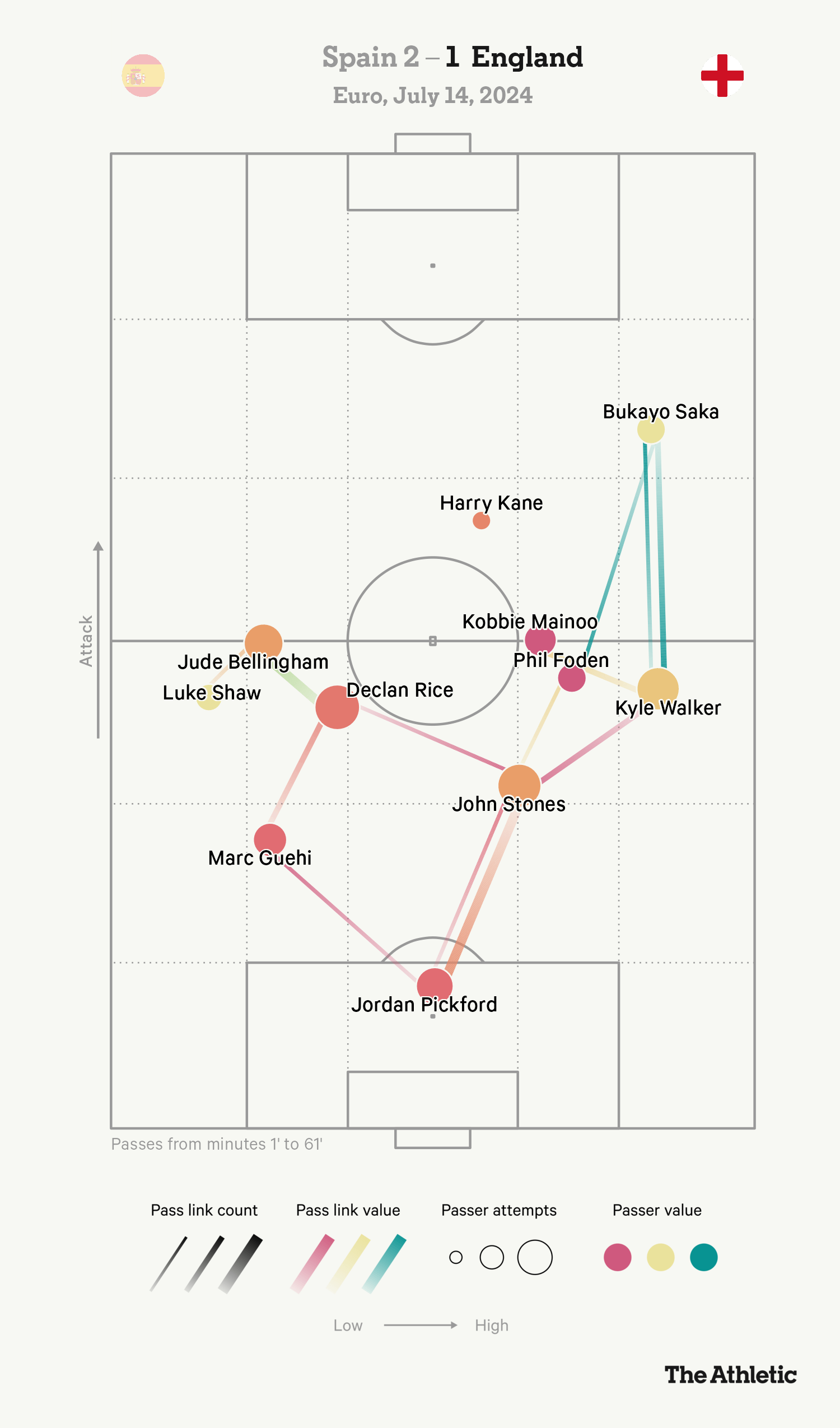
Spain’s, on the other hand, is a work of art.
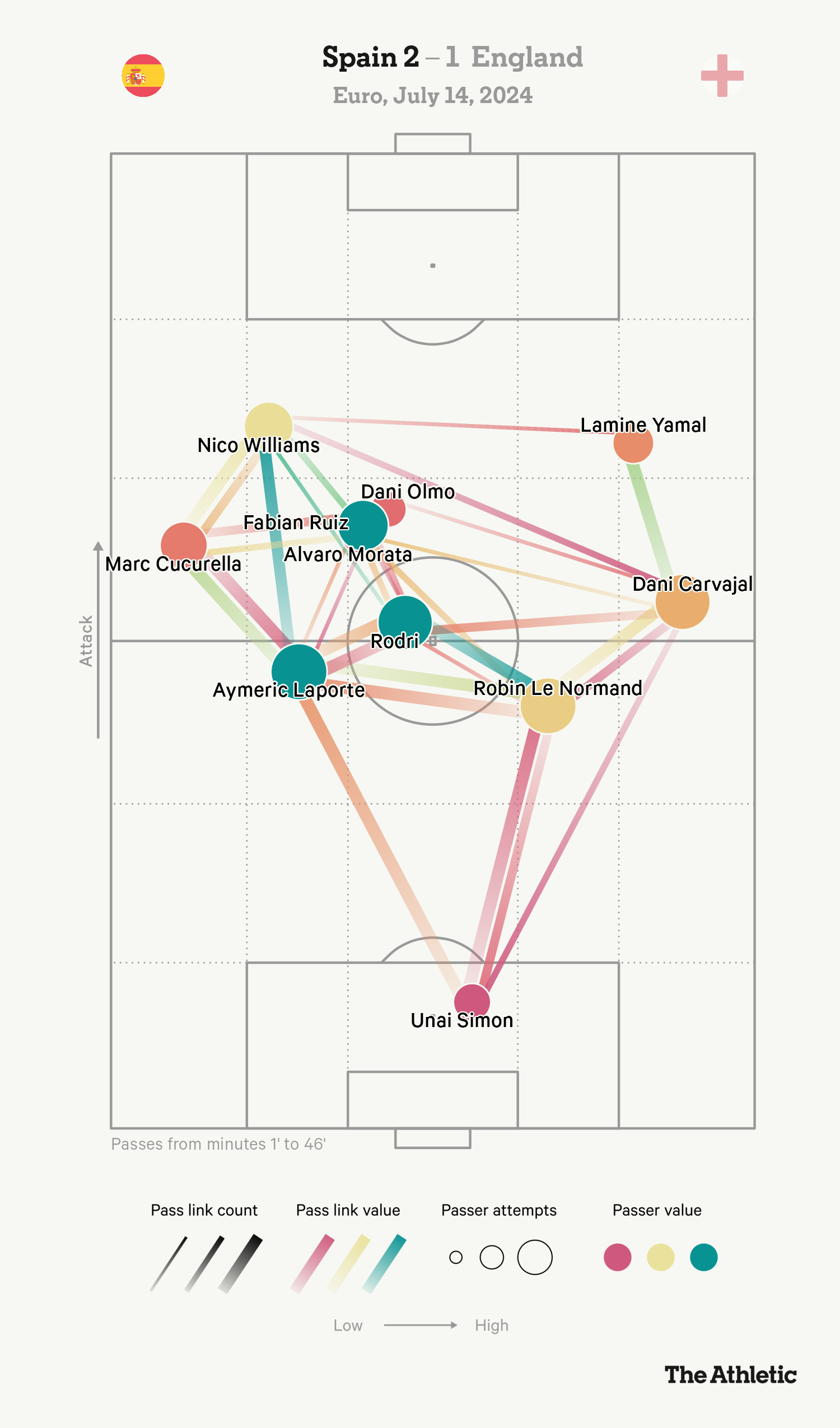
In terms of pressing, an admittedly difficult concept in tournament football, England were particularly passive, something that was not helped by the limited mobility of striker Kane. But pressing is also about organisation and England’s approach was disjointed. In the final third, despite all the great players, there was little sign of positive relationships between the players: no players seemed on the same wavelength (with the arguable exceptions of Bukayo Saka and Kyle Walker), no rotation, no player stretching the play to create space for others. And while England spent long periods on the defensive at this tournament, it is also difficult to recall many examples of England launching into counter-attack attack, something their forwards are all capable of individually.
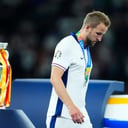
GO FURTHER
What’s next for Harry Kane and the role of England’s number 9?
This team has relied on moments of magic: Bellingham’s deflection to force extra time against Slovakia, Saka’s late equaliser against Switzerland, Ollie Watkins’ winner later against the Netherlands and Cole Palmer’s forced equaliser in the final. There’s also no denying that several newcomers – Marc Guehi, Ezri Konsa, Kobbie Mainoo – have shown brilliance and put in good performances.
But all this only goes to show the individual quality of the players. As a team, England were average and lucky to reach the final.
Their main problem once they reached the final was their pressing.
From the first minute, there seemed to be a desire to press high. From Spain’s first goal kick, England pushed high and tried to close in. But was there really a plan?
With six players (four Spanish defenders and two central midfielders) to close down the game, England press with five, leaving right-back Dani Carvajal free. Spain have an obvious ball out wide, so move the ball to that side of the pitch.
There are different ways for England could We pressed with five players here. If Bellingham blocks the passing lane to the right-back, for example, or England then move laterally up the pitch with Saka, on the near side, moving to pick out a central midfielder, you could say there was a plan.
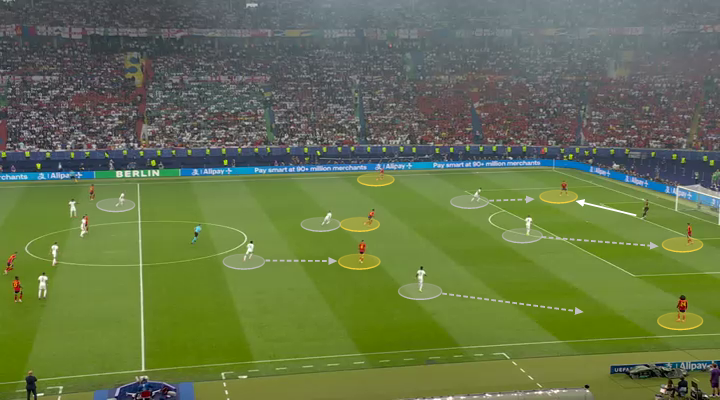
But England appear disorganised as, as Carvajal receives the ball, Luke Shaw looks nervously over his shoulder, unsure whether or not to jump forward and press. Carvajal has time to bring the ball up…
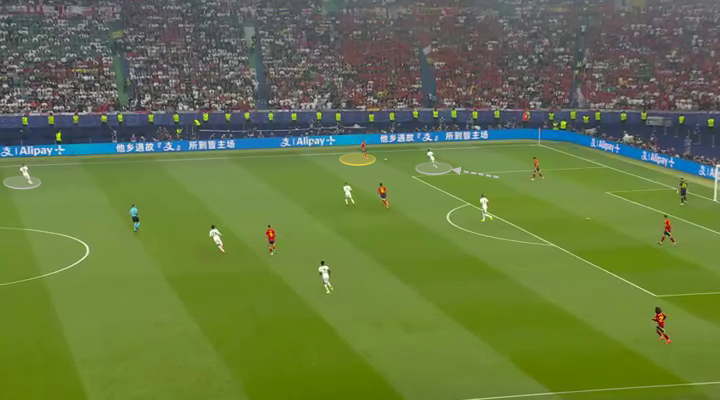
…and the play ends with Alvaro Morata, who has come deep to win the ball, trying to pass it to Lamine Yamal. OK, he would have been offside anyway, but barely a minute into the match Spain had managed to deceive England.
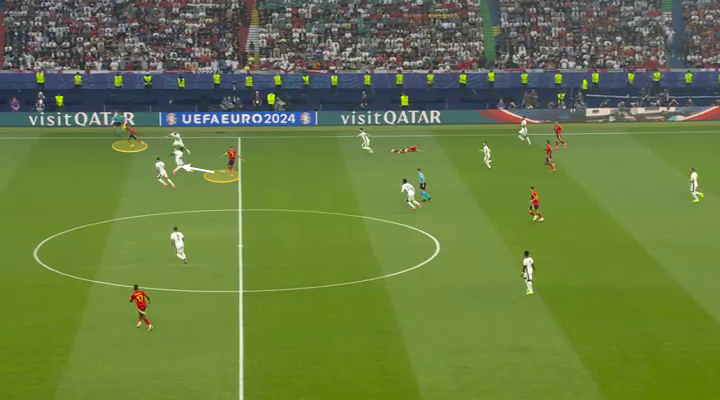
This was not an isolated case. The same situation occurs again 10 minutes into the match. Spain are playing from the back. Shaw is unsure whether he is supposed to jump or not. Bellingham seems to be telling him that he should.
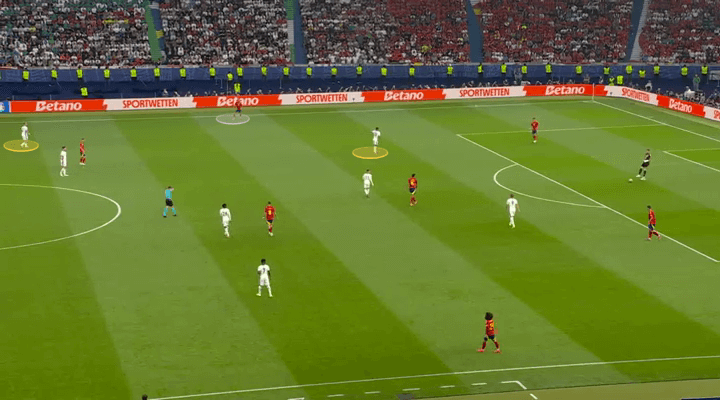
Spain move the ball forward towards this side. Bellingham tries to close the play down, but he does so individually. Shaw is miles away from Carvajal, so there is an easy ball out once again.
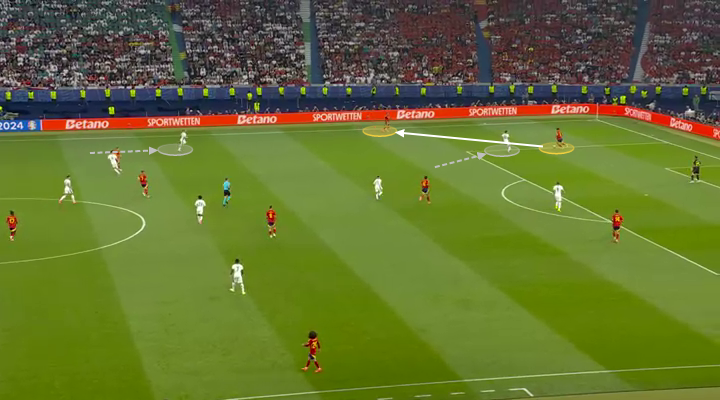
Carvajal then has time to catch a good long pass…
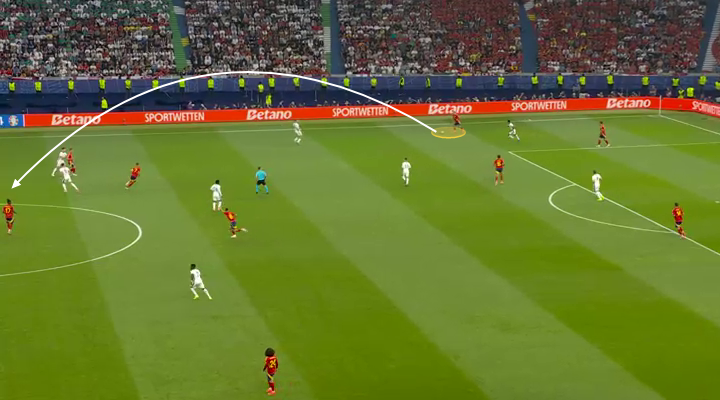
…and if Nico Williams had got his head on that ball, he might have been able to pass it to Fabian Ruiz who was running behind.
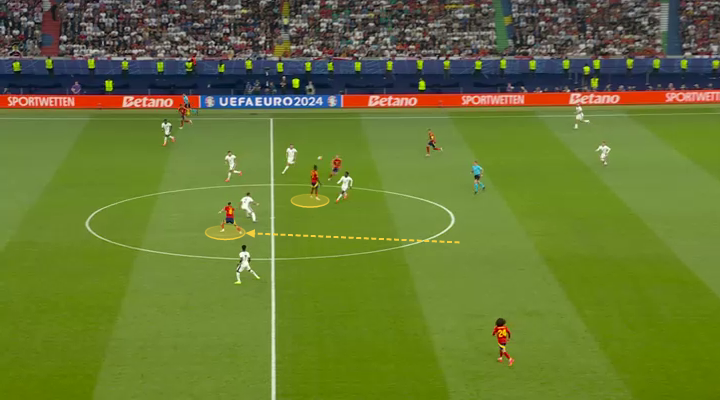
These problems have never really been solved.
In the second half, Spain changed their formation to a 4-2-3-1 from their original 4-3-3, but England had the same problem when trying to press in the middle third. Here, Bellingham gestures towards Yamal, probably asking Shaw to pick him up, although it’s impossible to know.
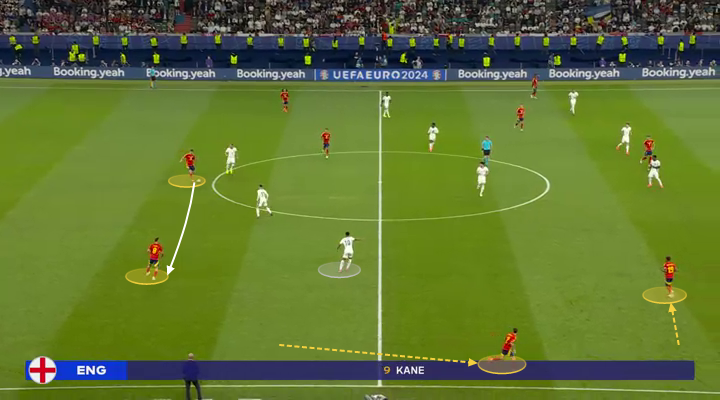
As the ball is played towards Shaw, we can just about see his outstretched arm pointing frantically – again, it’s not really clear what the organisation is here.
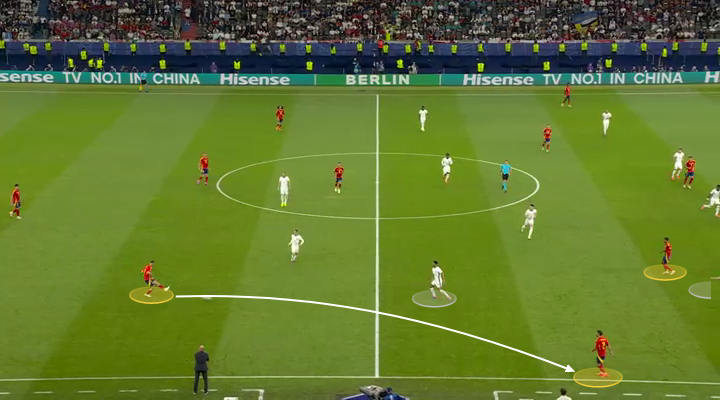
But somehow Shaw, who was excellent in one-on-one situations, found himself caught in the crossfire. He wasn’t close enough to press Carvajal, but he also let Yamal get close to him and the winger ran onto a clever pass from the outside of Carvajal’s foot into the corner.
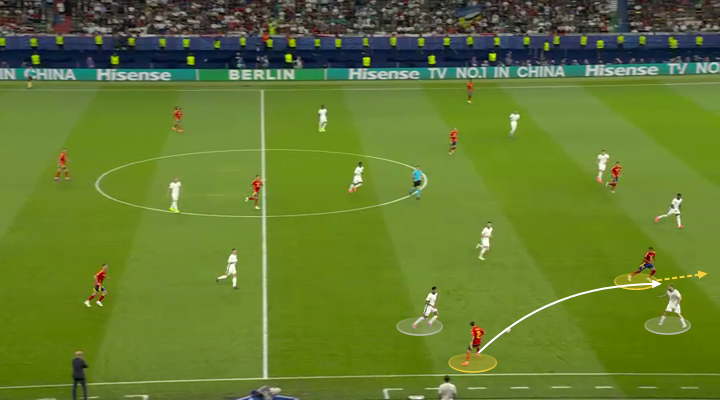
Yamal dribbles inside and passes the ball to Williams…
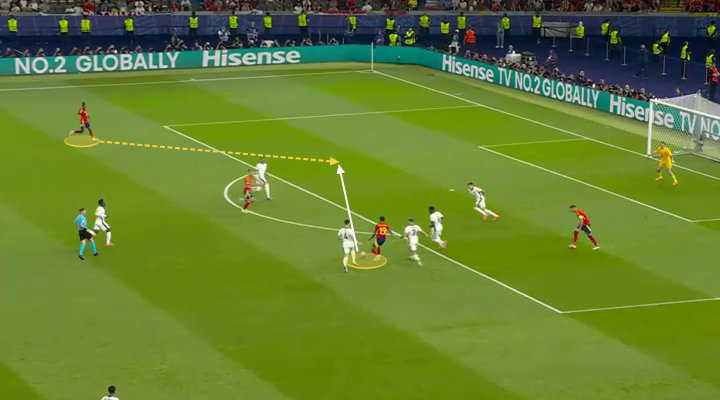
…which ends intelligently.
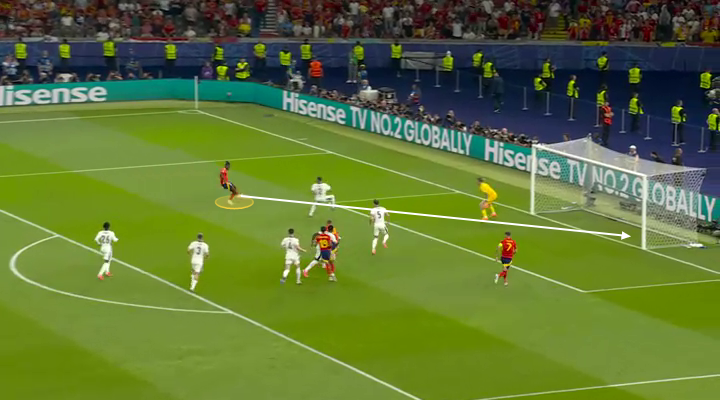
This pattern continued. Here, with Robin Le Normand carrying the ball into midfield, Yamal drifted inside with Carvajal on the overlap. Bellingham points something. Shaw too. But neither is really in a position to close down either player.
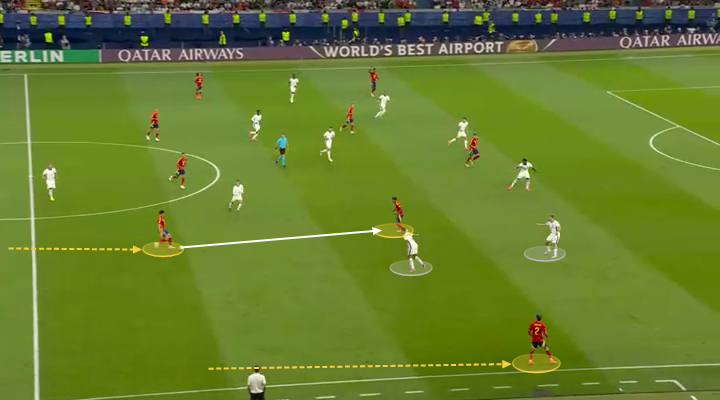
Yamal recovers the ball and plays it behind…
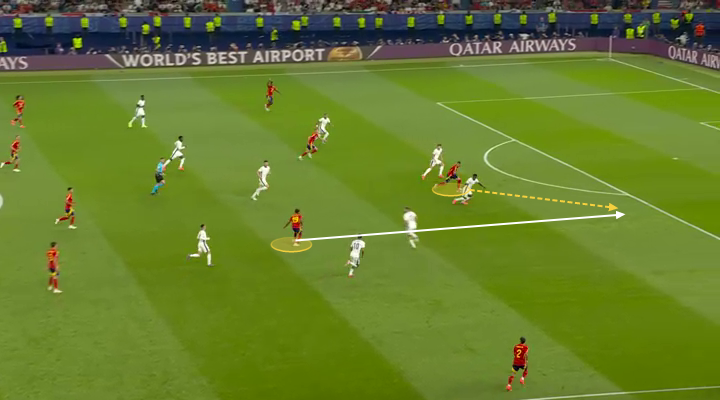
…and Morata is given a good chance to make it 2-0.
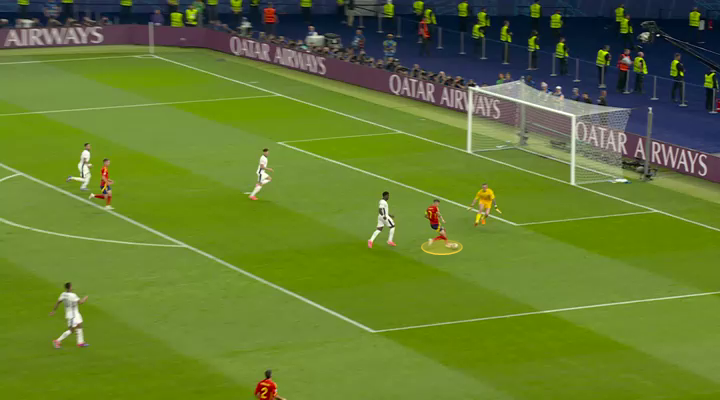
Spain’s winning goal actually came from the other flank.
And, in the dying minutes of a long tournament, England can be forgiven for not applying intense pressure here.
Yet the starting position of their attackers suggests that they wanted it, but this pass from Aymeric Laporte to Ruiz is very simple. There is no pressure on either player.
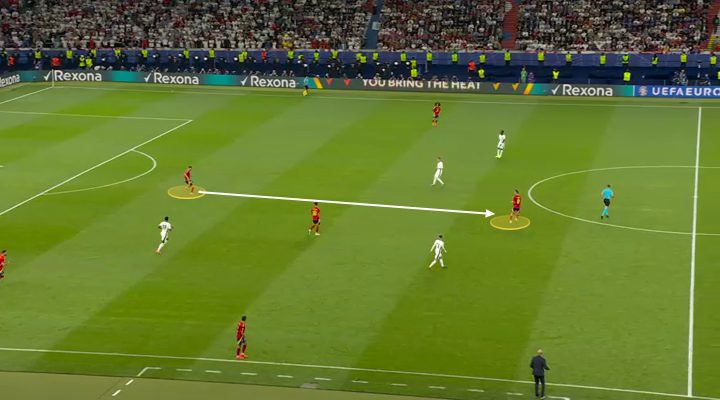
And then, on the other side, a familiar situation occurred. Walker is unsure whether to follow Dani Olmo on the inside, while Saka is unaware of Marc Cucurella’s run.
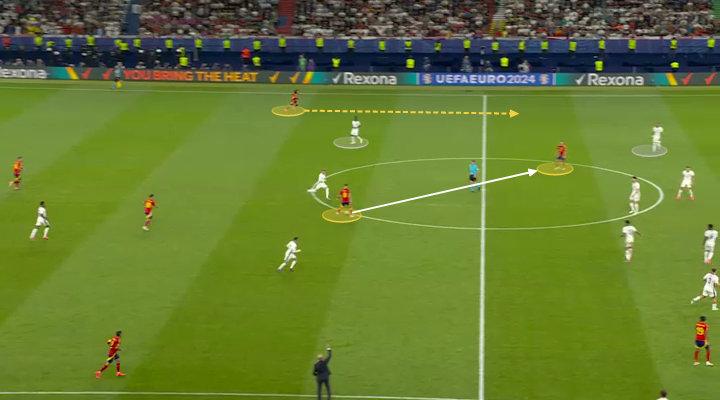
England open the scoring. Walker chases the shadows, the ball goes around him. From this point on, you just have to appreciate the quality of the goal — Mikel Oyarzabal follows up by sending the ball to Cucurella…
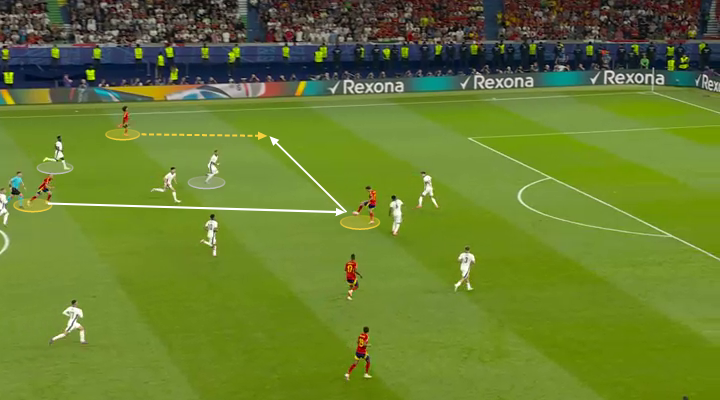
…then times his run into the box to recover the ball and score.
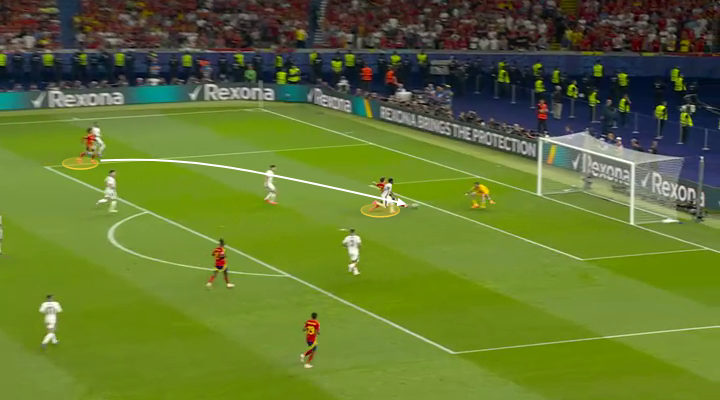
England were not completely unsettled in the final. They managed to reach half-time without conceding a single clear-cut chance. They got back into the game by using the bench. They defended set pieces well and had a good chance to equalise again from a corner late on.
But England played like outsiders, playing too many long balls and chasing as individuals rather than pressing as a real unit.
It is telling that they lost the second half to a team who were forced to cope without the man subsequently voted player of the tournament, Rodri.
Spain, collectively, were on a different level to England – last night and throughout the last month.